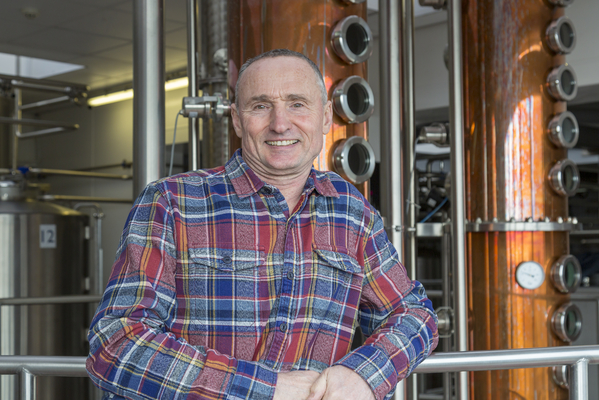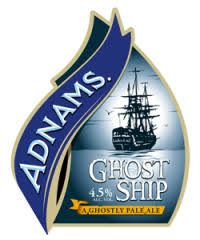Keg's big challenge to cask at Adnams
Added: Wednesday, May 16th 2018

Southwold in Suffolk is an unchanging icon of rural England. It’s celebrated for its multi-coloured beach huts, the stubby, whitewashed inshore lighthouse and homely traditional pubs. But there’s a revolution underway at the town’s most famous business, Adnams Brewery.
Back in the 1970s strong men would weep at the mere mention of Adnams’ beer. It was hard to find outside its heartland and many made the arduous pilgrimage to sup deep of Southwold Bitter in the small Suffolk town. The beers were pulled by handpump or straight from the cask in such delightful watering holes as the Harbour Inn and the Red Lion.
But there’s a lot more to Adnams than bitter these days. And – shock and awe – not all the proliferating brews are served in the time-honoured fashion. When I sat down with chairman Jonathan Adnams in the opulent splendour of the Swan Hotel fronting the brewery I checked I heard him correctly when he said early in our conversation: “By 2019 keg production will overtake cask.”
Surely not Adnams falling to keg? What has caused this astonishing turn round?
“There’s been a perfect storm in the beer world,” he says. “There’s a lot of cask beer from micros – some of it not very good. At the same time, fewer people are going to pubs while some publicans are putting in a lot of handpumps to offer choice.
“The beer is often poor quality and drinkers won’t pay £4 for poor beer. They want reliability. Cask is now a lottery for drinkers.”
Jonathan points out that, in the days when national brewers owned big estates of pubs, they would train their publicans in how to cellar and serve cask beer. Those days are long gone and “today there’s no longer value in cask and drinkers are happy to drink keg.
“The rate of change is fast. Only around one or two per cent of our production goes to our pubs. The free trade is vital for us and we have to listen to our customers and anticipate what they want.
“We’re proud of our cask beer but that won’t make consumers change their habits.”
Jonathan Adnams started work at the family brewery in the 1970s, working in the school holidays. When he had a full-time job, he would deliver beer to Cambridge twice a week but that was as far as sales went until a distributor broke into the London market. It was when he was put in charge of the brewery’s 75 pubs that he saw “the writing on the wall. Our pubs accounted for 60 to 70 per cent of our beer sales but then people started to eat at home and beer declined.”

When I went to Adnams in 1976 to write my first ever article about beer, the brewery was producing 40,000 barrels a year. It was an impressive amount for a small rural brewery where – as Jonathan’s predecessor Simon Loftus once said – “half our potential sales are in the sea.”
But the old brewery, built in the 19th century, was under strain with wooden fermenters that were hard to clean and a mash tun threatening to burst at the seams.
Work on a new brewhouse started in 2007. “We had to do it in stages over 18 years,” Jonathan says. “We started with new fermenters. We avoided conicals and remained with traditional yeast. Beer quality improved dramatically, with no infections.”
The new plant was designed for cask beer production. Seeing the way the market was moving, in 2013 Jonathan and head brewer Fergus Fitzgerald wrote a paper for the board arguing the case for the brewhouse to be extended to add new arms to the production line.
“We needed to be able to make bottom-fermented lager and keg beers, plus a distillery to make gin, vodka and whisky. We expanded the distillery in 2014 and 15 and then in 2016 we installed tanks, filters and centrifuges to the brewery along with an automated kegging line,” Jonathan says.
Today annual production stands at 114,000 barrels a year, with a further 10,000 barrels from the distillery. There’s a lot more to Adnams than Southwold Bitter, which accounted for 98 per cent of sales back in 1976.
The new brewhouse can handle three brews a day. Jonathan said that on the Thursday of that week 800 barrels would be made – “that used to be one week’s production.”
The plant was built by Briggs of Burton-on-Trent and is fully automated. It’s based on the continental system of mash mixer, lauter [filtration] vessel and copper whirlpool. Twenty fermenters are traditional squares but are covered to capture carbon dioxide. The plant is highly flexible, enabling not only ale but lager, which has 10 days primary fermentation and is then conditioned for a further three weeks.
In 2017 Fergus and his team knocked out some 41 beers and Ghost Ship, introduced six years ago, is now the biggest brand. Those strong men will weep again when they learn bitter is no longer top of the pile.

Bitter and Broadside are still cask ales but Ghost Ship is available in both cask and keg forms, as well as bottle. Blackshore Stout in keg and can is a big success and Jonathan says there are now fewer diehard Guinness drinkers. Other beers available in cask and keg, such as Easy Up IPA and Mosaic, are doing well, as is keg Dry Hop Lager.
Fergus Fitzgerald says his keg beers are neither filtered nor pasteurised and have a low gas pressure of 2psi – roughly the same as cask beer.
Adnams has 48 pubs. The number used to be 75 but the brewery has been disposing of outlets since 2006. Jonathan Adnams says all those that have been sold continue as pubs. “We’ve just sold one to a consortium in a village. We sell to people who can take them in a different direction.”
Adnams owns five hotels and there’s been a major investment in upgrading the flagship Swan in Southwold. There’s a big online business and there are several attractive shops throughout East Anglia selling wine and food as well as beer – Adnams has been a major wine merchant for many years.
Jonathan admits that Adnams’ business model is different to other family brewers, who have retained substantial pub estates where they can control the quality of cask beer, but he has no regrets for concentrating on the free trade.
And that trade is not confined to this country. Adnams exports far and wide to Australia, China, France, Scandinavia, Slovakia and South America. A small amount of beer goes to the U.S. but that’s expected to grow.
The company continues to win plaudits for its support for the environment. It was a pioneer in the brewing industry with a major recycling programme in both the brewery and a large warehouse at Reydon, just outside Southwold. The warehouse has a “living roof” made of natural vegetation that collects rain water used for cleaning floors and vehicles.
Water used in the distillery is pumped to the brewhouse where water use in general has been massively reduced. A heat recovery system has dramatically cut the emission of steam while all refrigeration has been replaced with more eco-friendly plant.
There are six brewery tours a day, including a visit to a tap room to sample the beers. Many still make that long journey to Southwold. The town remains a delight and – traditionalists be assured – you can still revel in cask beer in a clutch of unspoilt pubs. But, outside its heartland, Adnams’ keg beer is clearly here to stay.






